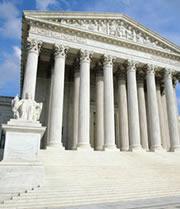 Will the US government regulate CO2 as an air pollutant?Getty
Will the US government regulate CO2 as an air pollutant?GettyThe Supreme Court of the United States yesterday heard a potentially pivotal case on climate change.
In Commonwealth of Massachusetts et al. v. the Environmental Protection Agency et al. a group of states, cities and environmental groups, plus American Samoa, are trying to force the federal government to regulate greenhouse gasses as pollutants.
The Environmental Protection Agency (EPA), with the support of a number of other states, does not want to do any such thing. It is claiming both that it does not have the authority to regulate greenhouse gasses, and that even if it did, it isn't obliged to exercise its authority (see Legal Arguments ).
Many see the case, along with the Democratic takeover of Congress, as a harbinger of change in how the United States deals with the issue of climate change — although it remains to be seen how it will pan out. After hearing the arguments, the court judges will retire to consider the case. A decision is expected this summer.
Uncertain certainty
Yesterday's oral arguments lasted an hour, while the judges grilled James Milkey, assistant attorney general from Massachusetts, and Gregory Garre, deputy solicitor general at the US Department of Justice.
There was some discussion of the level of uncertainty in climate-change science. The EPA says that such uncertainty is one of the reasons it should be allowed to delay judging the harm posed to humans by greenhouse gasses and defer regulation.
Justice Antonin Scalia seemed most disposed to agree with the EPA, saying "I gather that there's something of a consensus on warming, but not a consensus on how much of that is attributable to human activity." But most of the justices seemed to go along with the idea that climate change is happening, and is caused by anthropogenic emissions. Justice John Paul Stevens, for example, pointed to a brief filed in the case by climate scientists, who are unhappy that their National Academies' report on the subject has, in their view, been selectively used by the EPA to stress uncertainty.
There was also some debate about whether carbon dioxide should count as an airborne pollutant, given that its ill effects take place higher up in the atmosphere than what is normally referred to as 'air'.
Milkey countered that the EPA currently regulates air pollutants that produce acid rain — which manifest their ill effects in water.
Redressing injury
The question of legal 'standing' took up most of the court's time. In order to be in a position to sue, a party must be injured, and a decision in their favour must be able to redress that injury.
This technical point turned into a surprisingly scientific conversation. Massachusetts is arguing, amongst other things, that it will be injured when sea-level rise swallows up 300 kilometres of coastline. If US automobile emissions account for 6% of global emissions, and if extremely tough auto standards could reduce this contribution to roughly 3.5%, would the resulting reduction in climate change lessen the harm to Massachusetts?
Scalia asked whether there is really a straight-line relationship between emissions and sea-level rise. "Is that how it works? I'm not a scientist, but I'd be surprised if it was so rigid," he said. Chief Justice John Roberts pointed out that anticipated increases in emissions from China and elsewhere could throw such calculations out of whack.
ADVERTISEMENT
Most climate experts speak about much larger figures when discussing the reductions necessary to avoid harmful changes. Paul Epstein, associate director for the Center for Health and the Global Environment at Harvard Medical School, says that reductions of about 60% may be needed to avoid harm to human health and well being. "I hate to say anything that would hurt this case, but this is something that one cannot answer definitively," says Epstein. The global scale of climate change may well mean that no specific harm can be completely redressed by one specific action.
For now, a rough review of the judges' comments suggests that the court may be split, and that this case may ultimately be decided by moderate Justice Anthony Kennedy — a familiar circumstance for the Supreme Court.
Visit our supremecourthearsclimate.html">newsblog to read and post comments about this story.
